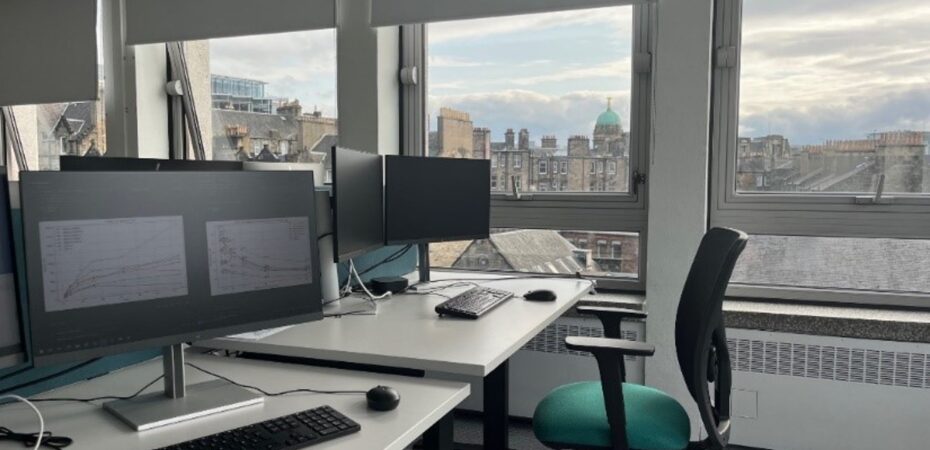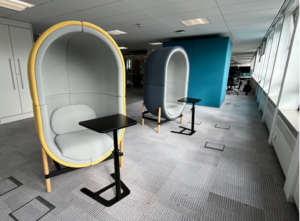Name: Rufus Easey
Year of study & degree: Year 4 Artificial Intelligence & Computer Science
Name: Aleksandr Sorokin
Year of study & degree: Year 5 MInf
Internship: AI Development Interns
Team within ISG: EDINA
Meal deal of choice: BLT + San Pellegrino water + Yorkie bar – Alex; Tomato and feta pasta + Arctic iced coffee + BBQ Hula Hoops – Rufus
Favourite floor in Argyle House: K
The title of your preferred work playlist: Epic Cinematic Soundscapes (AI Generated Playlist) – Alex; arrruuruuraahahharurAhh – Rufus
Opening Statement
This is a joint contribution by two AI development interns – Rufus and Alex. We share our experiences and insights gained during our time at ISG, reflecting on the challenges we faced, the projects we tackled, and the lessons we learned.
My first internship
I’m Rufus, I’m about to enter my final year as an Artificial Intelligence (AI) and Computer Science (CS) student at the University of Edinburgh, and this is my first internship. In fact, it’s my first ever experience of taking what I’ve learned about AI at university outside of the classroom and into a practical context, so, as you can probably guess, I’ve learned a whole lot. Despite my role as an AI Development Intern being a natural continuation of my 3rd year studies in Natural Language Processing and Machine Learning, I still went into this position with a measure of anxiety and very little knowledge of what to expect. Do I really know enough to be here? How much responsibility will I have? What does an AI developer even do? Writing this now, a little over halfway through my time here at ISG (the time has flown by!), it’s clear to me that there was no need to be nervous, and the experience has only served to build my confidence for the next year and beyond.
Second summer at ISG
Despite wiggling my way out of writing a blog post last summer, here I am again, in the same team, in a similar role, writing about the experience. I’m Alex, an Informatics (MInf) student going into my last year. Last summer I was working as a “GPT Analyst Intern” and, after experiencing a very exciting and fruitful internship, I returned to the role’s natural evolution – an “AI Development Intern”. Though the responsibilities are similar, the office now has fancy standing desks, access to GPUs and egg-shaped seats. It’s also crazy how fast the field is evolving – things that were pioneering experimental techniques last summer are commonplace and easily accessible now.
Life as AI Interns
What does AI development involve? A lot of experimentation. We are primarily tasked with running side-jobs and experimenting with issues related to the ELM – the Edinburgh Language Model. This project is an exciting opportunity to provide easy access to premium LLM features like document upload and prompt engineering. Our tasks can range anywhere from researching a potential area of interest, to evaluating methods used in the code base, to optimise performance. As a result, our day-to-day activities might vary between finalising a 20+ page technical report or searching for the best way to extract Lord of the Rings quotes from still images.
Our first project took almost four weeks to finalise and culminated in us directly altering ELM’s code to change its behaviour and improve its performance. The task was to evaluate different strategies of retrieval-augmented generation (RAG), for the purposes of optimising ELM’s document upload feature. Involving large amounts of research, writing code, and running experiments, this was an excellent opportunity for the two of us to get to know each other through pair programming and to help the team in a real way within our first few weeks on the job – not to mention the valuable lessons we learnt regarding the amount of effort and cost that goes into these kinds of processes.
Other tasks we’ve tackled include optimising text extraction methods, which really became a test to see which method best preserved Lord of the Rings quotes, and researching evaluation techniques for general models, with the hope of comparing fine-tuned university models against established benchmarks in the future. We’re also on the lookout for cost-saving strategies, whether that means finding better alternatives for proprietary models or figuring out more efficient ways to route requests between proprietary and open-source models. Our work frequently involves using cutting-edge open-source projects (so cutting-edge, in fact, that updates for issues we encounter often roll out weekly), which occasionally means rolling up our sleeves to fix these projects ourselves. Frequently downloading datasets, models and fun new libraries has certainly been doing a number on our disk space (as I write this, my laptop is again complaining about low disk space… – Alex).
Closing Statement
Our internship at ISG won’t be done for another month yet and we’re excited for the challenges to come, but as you can see, we’ve already learned plenty! For Rufus, this first look at the professional world of AI and the current state of the art is invaluable for both my confidence and ability as a student. For Alex, returning for a second summer has provided a deepened understanding of the evolving landscape of AI development, reinforcing the value of continuous learning and adaptation.
Working on the ELM project has shown us the real-world applications of AI, beyond classroom exercises and theoretical concepts. It will be nice to see the project become more widely known among fellow students. The dynamic and collaborative environment at ISG, coupled with the opportunity to work on cutting-edge projects, has not only prepared us for future endeavours directly within the AI field but has also imparted invaluable skills and insights that will be beneficial for any professional path we pursue.
Some final thoughts on the future from each of us…
Alex: As we move forward, we carry with us the lessons learned and the memories made, ready to tackle new challenges with the confidence and expertise gained during this incredible internship. Asking GPT4 for an inspirational quote, it fittingly gave this one “Success is not the key to happiness. Happiness is the key to success. If you love what you are doing, you will be successful.” – Albert Schweitzer
Rufus: “Where is the horse and the rider?
Where is the horn that was blowing?
They have passed like rain on the mountains,
like wind in the meadow.
The days have gone down in the West,
behind the hills… into Shadow.
How did it come to this?” – Théoden



